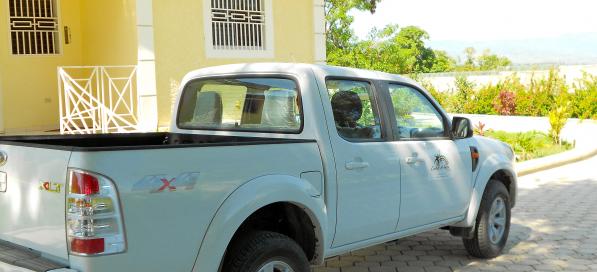Electricity Comes To The Orphanage

Finally, after many years of neglect, electrical power has been restored to Hinche along the Route 3, the main highway through the middle of the country that connects Port Au Prince in the south with Cap-Haitien in the north. Businesses and residences are now able to access that source of power provided they are able to pay for the cost of the connections. We are paying for 16 power poles and a transformer to bring electrical power to our orphanage. Construction began last week and is expected to be completed in a couple of weeks. We do not know how reliable the service will be and will continue to maintain our generator connections as a back up. The new service should enable us to connect the entire site at the same time without concern for power adequacy. After 8 years, we are once again grateful for God’s abundant blessings in the form of answered prayer.
 When we started work on our site in 2004, there was no electrical service in Hinche, a city of over 100,000 people. We knew that we would need a generator in order to have electrical power to run a pump for a well and to operate appliances, including fans. The Wilton, Connecticut Rotary agreed to give us $4,000 to purchase a generator. Little did they or we know that a generator with adequate power to run our orphanage would cost a lot more than $4,000 and did not include the cost of inverters and batteries necessary to have power on a 24x7 basis. In fact, our primary concern 8 years ago was whether to bring a generator on site before we had the buildings in place and a security wall constructed. Fortunately, our stubbornness prevailed and we did not acquire a generator immediately. We waited to ascertain our electrical power needs and determined the size generator that would be required. We made the right call.
When we started work on our site in 2004, there was no electrical service in Hinche, a city of over 100,000 people. We knew that we would need a generator in order to have electrical power to run a pump for a well and to operate appliances, including fans. The Wilton, Connecticut Rotary agreed to give us $4,000 to purchase a generator. Little did they or we know that a generator with adequate power to run our orphanage would cost a lot more than $4,000 and did not include the cost of inverters and batteries necessary to have power on a 24x7 basis. In fact, our primary concern 8 years ago was whether to bring a generator on site before we had the buildings in place and a security wall constructed. Fortunately, our stubbornness prevailed and we did not acquire a generator immediately. We waited to ascertain our electrical power needs and determined the size generator that would be required. We made the right call.
We acquired a generator, three inverters and 48 batteries to provide 24x7 electrical power to the orphanage. Unfortunately, that has turned out to be the easy part. Since that time, we’ve been plagued by a lack of competent electricians to properly service the generator and to properly install the inverters and batteries. It turns out that the generator requires regular monthly service and lots of diesel fuel. Added to this ordeal was the damaged caused by the 12 thugs this past April that tried to steal the inverters and batteries and destroy the generator (See April 12, 2012 blog post “Error In Judgment – A Shame.” Under these conditions, we have limped along with the uncertainty of electrical power at the site.

